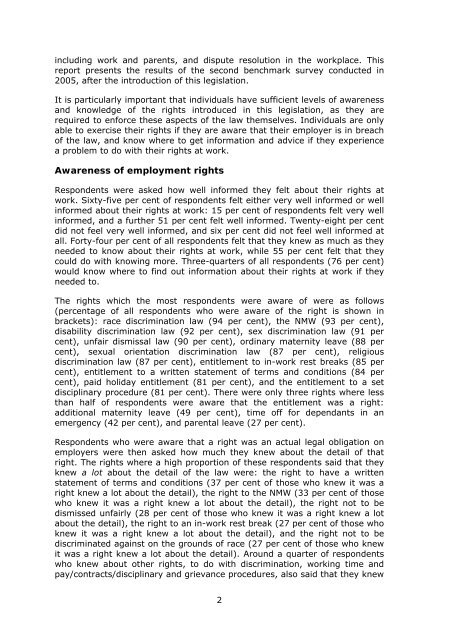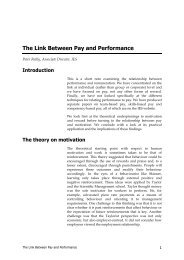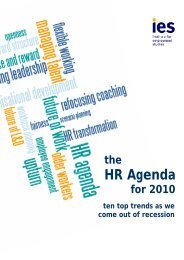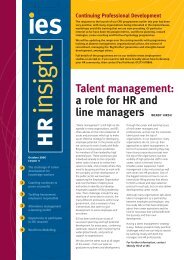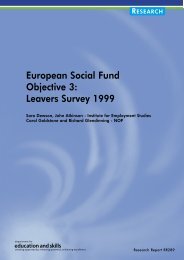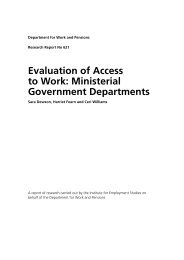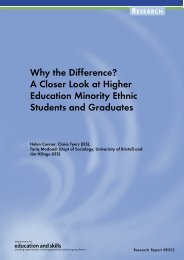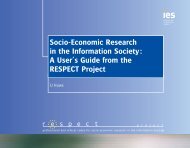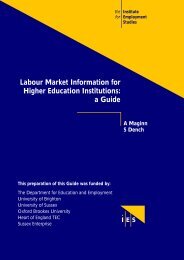Employment Rights at Work: Survey of Employees ... - DTI Home Page
Employment Rights at Work: Survey of Employees ... - DTI Home Page
Employment Rights at Work: Survey of Employees ... - DTI Home Page
- No tags were found...
You also want an ePaper? Increase the reach of your titles
YUMPU automatically turns print PDFs into web optimized ePapers that Google loves.
including work and parents, and dispute resolution in the workplace. Thisreport presents the results <strong>of</strong> the second benchmark survey conducted in2005, after the introduction <strong>of</strong> this legisl<strong>at</strong>ion.It is particularly important th<strong>at</strong> individuals have sufficient levels <strong>of</strong> awarenessand knowledge <strong>of</strong> the rights introduced in this legisl<strong>at</strong>ion, as they arerequired to enforce these aspects <strong>of</strong> the law themselves. Individuals are onlyable to exercise their rights if they are aware th<strong>at</strong> their employer is in breach<strong>of</strong> the law, and know where to get inform<strong>at</strong>ion and advice if they experiencea problem to do with their rights <strong>at</strong> work.Awareness <strong>of</strong> employment rightsRespondents were asked how well informed they felt about their rights <strong>at</strong>work. Sixty-five per cent <strong>of</strong> respondents felt either very well informed or wellinformed about their rights <strong>at</strong> work: 15 per cent <strong>of</strong> respondents felt very wellinformed, and a further 51 per cent felt well informed. Twenty-eight per centdid not feel very well informed, and six per cent did not feel well informed <strong>at</strong>all. Forty-four per cent <strong>of</strong> all respondents felt th<strong>at</strong> they knew as much as theyneeded to know about their rights <strong>at</strong> work, while 55 per cent felt th<strong>at</strong> theycould do with knowing more. Three-quarters <strong>of</strong> all respondents (76 per cent)would know where to find out inform<strong>at</strong>ion about their rights <strong>at</strong> work if theyneeded to.The rights which the most respondents were aware <strong>of</strong> were as follows(percentage <strong>of</strong> all respondents who were aware <strong>of</strong> the right is shown inbrackets): race discrimin<strong>at</strong>ion law (94 per cent), the NMW (93 per cent),disability discrimin<strong>at</strong>ion law (92 per cent), sex discrimin<strong>at</strong>ion law (91 percent), unfair dismissal law (90 per cent), ordinary m<strong>at</strong>ernity leave (88 percent), sexual orient<strong>at</strong>ion discrimin<strong>at</strong>ion law (87 per cent), religiousdiscrimin<strong>at</strong>ion law (87 per cent), entitlement to in-work rest breaks (85 percent), entitlement to a written st<strong>at</strong>ement <strong>of</strong> terms and conditions (84 percent), paid holiday entitlement (81 per cent), and the entitlement to a setdisciplinary procedure (81 per cent). There were only three rights where lessthan half <strong>of</strong> respondents were aware th<strong>at</strong> the entitlement was a right:additional m<strong>at</strong>ernity leave (49 per cent), time <strong>of</strong>f for dependants in anemergency (42 per cent), and parental leave (27 per cent).Respondents who were aware th<strong>at</strong> a right was an actual legal oblig<strong>at</strong>ion onemployers were then asked how much they knew about the detail <strong>of</strong> th<strong>at</strong>right. The rights where a high proportion <strong>of</strong> these respondents said th<strong>at</strong> theyknew a lot about the detail <strong>of</strong> the law were: the right to have a writtenst<strong>at</strong>ement <strong>of</strong> terms and conditions (37 per cent <strong>of</strong> those who knew it was aright knew a lot about the detail), the right to the NMW (33 per cent <strong>of</strong> thosewho knew it was a right knew a lot about the detail), the right not to bedismissed unfairly (28 per cent <strong>of</strong> those who knew it was a right knew a lotabout the detail), the right to an in-work rest break (27 per cent <strong>of</strong> those whoknew it was a right knew a lot about the detail), and the right not to bediscrimin<strong>at</strong>ed against on the grounds <strong>of</strong> race (27 per cent <strong>of</strong> those who knewit was a right knew a lot about the detail). Around a quarter <strong>of</strong> respondentswho knew about other rights, to do with discrimin<strong>at</strong>ion, working time andpay/contracts/disciplinary and grievance procedures, also said th<strong>at</strong> they knew2


